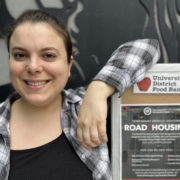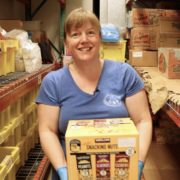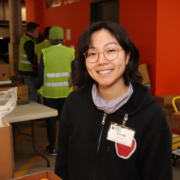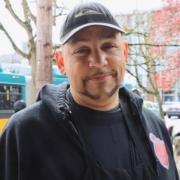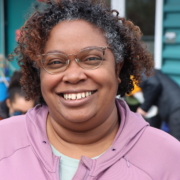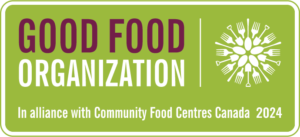Meet Karilynn Cooper, our Community Connector
Where did you grow up?
Born and raised in Sacramento, CA.
What is your background?
For my educational background I earned a BA in social work from Cal State Sacramento. Professionally I spent 7-8 years doing various social work or case management roles at a variety of organizations. I worked with AmeriCorps in Spokane and that brought me to Seattle in 2015. I’ve worked with people living with HIV, people with substance disorders and severe mental illness.
When did you start at University District Food Bank?
Late September of 2021. My title is Community Connector officially, but I also go by Community Engagement and Resource Specialist. My role can also be referred to as a social worker. I help our shoppers obtain various resources including housing, SNAP benefits and more.
What is your role within the organization?
I prioritize client work and spend at least 50 percent of my time with clients of the Food Bank, but it varies day to day based on what our clients need. I operate a walk-in program to make it easier for customers to have access to my services vs. making appointments. This helps to meet people where they are at and not feel constrained or that they will miss an appointment. I will also offer appointments if that’s easier for another client.
Shoppers find me by word of mouth typically I also have cards and flyers around the Food Bank to inform someone who might be new. Customers often come in to shop and ask if we have someone who can help them with accessing services.
Some needs are quick and simple, and others require a lot of help. I will meet with them as many times as it takes to get them the access to the resources they need. If their needs go above my abilities, I will recommend them to other local services.
What is the most fulfilling aspect of your work?
I love the relational part of the job, not so much the paperwork! I have a lot of regular customers that I’ve bonded with over the last year. Some will come in just to touch base about their life – share their triumphs or setbacks. I love that they are comfortable to come to me and share this info.
I encourage people to come back and share updates and keep in touch, I love those moments with them. It’s a difficult job for sure and those are the parts that keep me sane and keep me going.
The most difficult part of this position is seeing the many setbacks within the systems in place and the hoops that customers must jump through. As a society we’re not prepared to care for people who are chronically homeless. This has required me to change my outlook in order to move forward and be present with clients. It’s taught me to celebrate the small wins.
I’ve seen a lot of small wins over the last year and positive changes in people. And it’s important for our customers to have someone who holds on to those wins for them, someone who notices how hard they are working and acknowledges that.
What would you like our donors and volunteers to know about the Food Bank?
I want to extend gratitude to the volunteers and staff. They have such strong relationships with our clients that it makes it easier for customers to trust me because they know we all have their best interest in mind. Thank you to everyone who makes this community go around.

